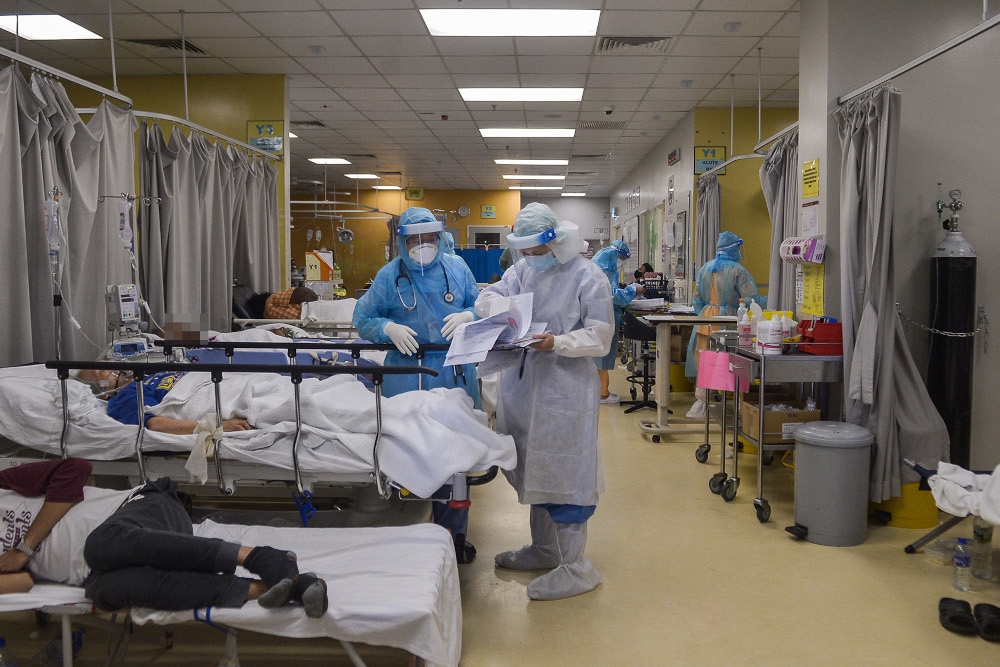JAKARTA, June 14 — Rana was eight when, at the height of Indonesia’s devastating second Covid-19 wave, first her father, then her mother fell ill. They never recovered, dying within hours of each other in June 2021.
Two years on, she still attends school and lives in the family home in West Java province, cared for by her 23-year-old sister who now works long days in a garment factory to support them. It is a responsibility that sometimes feels overwhelming.
“Since I lost them, I’ve become the primary caregiver, and it’s not an easy task,” said Rana’s sister, who requested anonymity and asked for a pseudonym to be used for her sister to protect their identity.
“I’m very worried whenever I leave my little sister by herself,” she told the Thomson Reuters Foundation by email.
Between 10.5 million and 12.4 million children are estimated to have lost at least one parent or caregiver to Covid, a 2022 study in The Lancet showed, many struggling with poverty as well as grief due to the loss of their family’s main breadwinner.
“Losing a caregiver also means losing a breadwinner. It’s a downward spiral in economics and the poorest are the most affected,” said clinical psychologist Lorraine Sherr, who is part of a global Covid-19 orphanhood research group.
While some hard-hit countries, including Indonesia, implemented aid for the pandemic’s orphans, researchers and children’s charities fear they could now be overlooked as the world moves on from Covid and emergency support is cut back.
“We’ve got on with our lives and gone back to a new normal. But for these children without their caregivers, they can’t go back,” said Seth Flaxman, a computer scientist and associate professor at Oxford University who helped create the orphanhood estimates using data from Covid death tolls.
The World Health Organisation (WHO) ended its three-year global Covid emergency last month and comprehensive real-time data on Covid deaths is no longer being updated, making it harder for researchers to accurately estimate the number of orphans.
That could mean many orphans are unaccounted for going forward, leading to even fewer specialist support services, said Juliette Unwin, a researcher from Imperial College London who has worked with Flaxman.

Bereaved children
Covid-19 has killed more than 6.9 million people globally since it first appeared in late 2019, but mental health and financial provisions for the children left behind are scarce, charities and researchers say.
Bereaved children are at higher risk of suffering mental health problems or dropping out of school and are more likely to fall into substance abuse or sexual exploitation, said Sherr, a professor at University College London.
Some poorer countries with high death tolls, such as Peru and Brazil, did provide financial aid to guardians to support children who have lost a parent to Covid. In hard-hit Colombia, a similar bill was proposed in parliament.
In Indonesia, where about 341,000 children lost at least one caregiver to Covid — the second highest number in the world after India — authorities and charity Save The Children provided cash support and counselling to orphans during the pandemic.
But that ended last year, said Rana’s sister, leaving them to fend for themselves.
“The assistance is not enough in the long run,” she said.
The responsibility of caring for orphaned children often falls on relatives who are ill-equipped to meet their needs, said Dewi Sri Sumanah, a spokesperson for Save the Children.
“The children... are experiencing profound grief, especially if they’ve lost both parents. Some of them feel guilty, some are angry because they couldn’t see their parents before they died,” said Sumanah.
“But we can’t forget about the extended families who are taking care of these children, especially those living in poverty.”
Generation Covid
Many of the world’s Covid orphans come from countries with high rates of poverty. Some 2.7 million children from South and South-east Asia and 2.19 million African children lost at least one parent to Covid, Imperial College London data showed.
But even Covid orphans in wealthier countries face an uncertain future as policymakers shift their focus elsewhere, charities and children’s rights advocates say.
“My hope is that we haven’t completely lost sight of a generation of Covid bereaved children,” said Letizia Perna, director of services at British support charity Winston’s Wish.
She said scant government support meant childhood bereavement charities were plugging the gaps, with demand continuing to rise as more young people start to process their grief.
But even small cash grants, periodic visits by counsellors or joining peer networks can make a big difference to orphaned children’s prospects, said Sherr.
In India, where more than 2 million children were orphaned by Covid according to Imperial College London data, local authorities, the UN children’s agency and mental health centre Mind Piper partnered in 2021 for a cash transfer and counselling programme in Uttar Pradesh, the country’s most populous state.
It helped children and relatives process their trauma and grief, and provided ongoing financial aid to prevent school drop-outs, child labour or early marriages, said Unicef social policy specialist Piush Antony, who led the programme.
Aiming to support 10,000 vulnerable children, including 500 orphans, the initiative ended in December though the state government will maintain aid until the children turn 18.
One of its beneficiaries, a girl who lost both parents, is now studying engineering in college — a dream she thought she would have to give up, Antony said.
“You can never replace a parent,” she said.
“But through these kinds of interventions, we believe that, at least for that generation of children, we have been able to make sure there are no long-term, avoidable consequences of trauma.” — Reuters






















